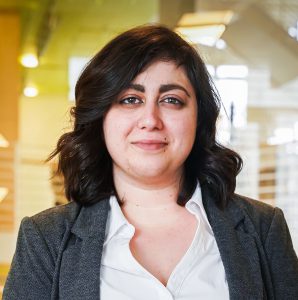
Rohina Zavala
CFCC Truancy Court Program Coordinator
By Rohina Zavala, CFCC Truancy Court Program Coordinator
During the Spring 2022 session, CFCC’s Truancy Court Program (TCP) worked with 85 students and their families at five Baltimore City Public Schools: Furley Elementary School, Franklin Square Elementary/Middle School, Mt. Royal Elementary/Middle School, the Academy for College and Career Exploration (ACCE) (middle/high school), and the Baltimore Design School (BDS) (middle/high school).
For the first time since returning to in-person learning, the TCP team was able to invite parents and family members to graduation ceremonies at each school! To make TCP graduation determinations, the entire TCP team (the volunteer judge at each school along with the TCP Mentor, Attorney, Social Worker, and Coordinator) review each student’s improvements during the semester in the areas of attendance, academics, and attitude. Students who have shown a 65% decrease in absences and/or tardies, improved two or more of their grades since participating in the TCP, and/or shown significant personal development under the discretion of the TCP team, graduate from the program.
Applying these measures, 52 of the 85 participating students (61%) graduated from the TCP in Spring 2022—47 met graduation requirements by decreasing their absences and/or tardies, and five by demonstrating improved academic performance/personal development. Sixty-one participating students (72%) completed the program by attending at least half of the sessions, but did not meet the criteria for graduation. We are proud of all of our TCP students. They faced much bigger hurdles in the midst of the ongoing pandemic, especially during and immediately following the January surge of the Omicron variant of Covid-19.
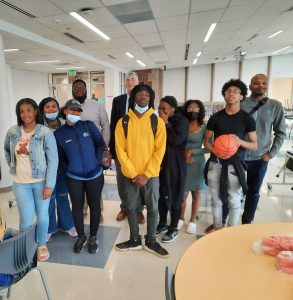
Spring 2022 TCP graduates at the Academy for College and Career Exploration with volunteer TCP Judge David Fishkin, TCP Restorative Practices Intern Chris Kelly, and ACCE School Community Coordinator Pierre Sanders.
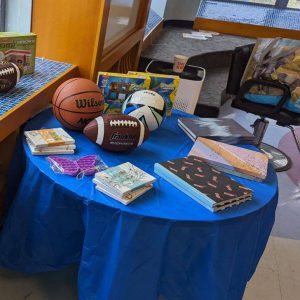
TCP graduates can select from an assortment of graduation gifts to honor their achievement.
Highlights & Challenges from the Spring
Family Fun Night at Furley Elementary
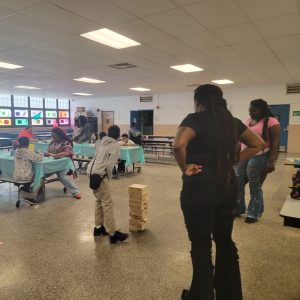
TCP families play Giant Jenga at the Furley Family Fun Night.
Engaging and often re-engaging parents in their students’ academic success is one of the most consistent problems faced by schools. A report by the American Psychological Association shows that “parent engagement in schools can promote positive education and health behaviors among children and adolescents … including school attendance and higher grades and classroom test scores.” Unfortunately, many parents have negative memories of their own time in school and as a result are reluctant to engage with their child’s school.
The TCP’s Family Fun Night at Furley Elementary on May 7, 2022 focused on bolstering parent engagement with the school and the TCP. The theme was Family Game Night, with all TCP families and friends invited to the Furley Elementary cafeteria to enjoy games, dinner, and dessert. Highlights from the evening included: the incredibly popular game of Giant Jenga, a surprise guest appearance by the Principal of Furley Elementary School, Greta Cephas, and one family winning a new Bluetooth speaker in the night’s raffle.
Art Contest: What Is a Family?
The theme of CFCC’s art contest for Baltimore City Public School Students was “What is a family?” This intentionally broad theme allowed students to express their thoughts in a wide range of media. Student art entries ranged from colorful depictions of family members to locations and phrases that encompass what a family is to the students.
All submitted artwork can be seen on our online gallery and will be displayed during the 2022 CFCC Symposium on Protecting Family Integrity at the University of Baltimore School of Law in the Fall.

Sixth grade students at Franklin Square Elementary/Middle School share pizza and work on their CFCC Art Contest entries.
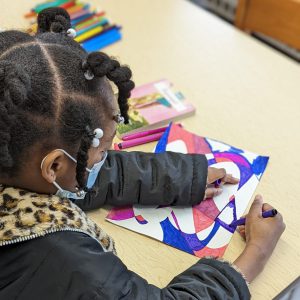
A fourth grade student at Furley Elementary School works on her submission for the CFCC Art Contest.
Ramping Up Tutoring
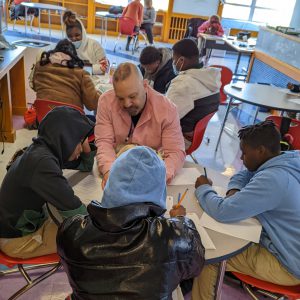
TCP Mentor Arion Alston tutors a group of sixth grade students at Franklin Square Elementary/Middle School.
By March 2022, the TCP team noticed that students at all of the TCP schools were improving their attendance but quickly losing motivation for improving their academics. Hoping to address this issue, the TCP responded with two distinct tactics: increasing the availability of in-person tutoring during TCP sessions and using a portion of the students’ one-on-one time with the TCP Judges to discuss academic concerns. The TCP Judges helped students to create detailed study plans, role-played best practices when asking teachers for help, and offered advice on how each student could overcome obstacles in class.
Workshops
This Spring, the TCP Team invited several guest speakers to share their expertise and practical skills to support the current and future success of TCP students.
- CFCC Administrative Program Specialist, Katrice Williams, facilitated interactive resume-building workshops at both Baltimore Design School and the Academy for College and Career Exploration (ACCE).
- CFCC Executive Director, Rebecca Stahl, conducted workshops in five TCP schools on trauma-informed strategies and interventions for when youth are feeling overwhelmed by nervous system dysregulation.
- University of Baltimore School of Law Director of Diversity Initiatives and Recruitment Mark Bell, spoke to students at ACCE and Furley Elementary about how to stay motivated in the face of adversity and how to achieve your goals.
- TCP Mentor, Arion Alston, and TCP Attorney, Spencer Hall, conducted a workshop on how to navigate the Youthworks online application and general employments rights at Baltimore Design School and ACCE.
What We Heard
What Students Value Most from the TCP Experience
“When we had restorative circles, because it made me care more about school.” – elementary school student
“Making new friends, the snacks, everything!” – elementary school student
“Talking about our life experiences at the table and in the circles.” – high school student
“Being able to watch my greatness grow while finishing school these last couple of weeks. Also learning new things about the importance of school.” – high school student
“How we learned about stuff they never talk about in normal classes.” – high school student
Teachers’ Insights into the TCP
“BEYOND proud of [Student’s Name] hard work to finish the quarter strong. This quarter really showed her resilience and capabilities to power through when the content gets tough. She is proud of her A [in the class] and SO AM I!” – Baltimore Design School (BDS) Teacher
“[Student] has done great the last couple of weeks… Been participating and turned in some of the classwork that was missing!” – the Academy for College and Career Exploration (ACCE) Teacher
“Generally speaking, beyond proud of [Student’s Name] improved attendance, engagement, and academics performance this quarter.” – BDS Teacher
Why TCP Judges Volunteer with the Program
“I really enjoy volunteering for TCP because everyone on the staff is so dedicated to helping the students. I find that during every semester, TCP provides significant help to students, and often to many students. From my perspective as a judge who presides over so many serious criminal cases, programs like TCP are so crucial in directing, or keeping, young students on the right track so they become successful adults rather than ending up in the criminal justice system.” Judge Charles Peters, Maryland Circuit Court
“What I find especially compelling about the Truancy Court Program is the opportunity to make a connection with each student. I am truly inspired by their potential and youthful energy. I also really enjoy working with the TCP team. The team has a vibrant sense of idealism and creativity that makes the sessions exciting.” David Fishkin, Retired Public Defender
“Working with CFCC has given me the opportunity to work with youth at an early stage to address and maybe prevent the involvement of those youth going to the Juvenile Justice system. There is a direct correlation between truancy and delinquent behavior (the school to prison pipeline). As a Public Defender I see youth every day whose chronic truancy has directly led to delinquency, but I rarely have the chance to address Youth before they enter the Juvenile Justice System and the CFCC Truancy Court program gives me that opportunity.” Mark Friedenthal, Assistant Public Defender at the Office of the Public Defender Maryland
“I enjoy volunteering with TCP and watching imaginations get sparked. I enjoy seeing the potential in young people who often only hear about their limitations. It is satisfying to establish a rapport with them, to earn that first smile from them, and to watch them excel. Sometimes the little things are actually the big things. For example, as I handed each young man their certificates of achievement, I encouraged them to shake with a firm grasp and to maintain eye contact. I enjoyed sharing those little lessons that can assist students in accomplishing their big goals.” Judge Diana Smith, Maryland District Court
Case Studies Highlighting TCP’s Holistic Approach
Perseverance & Triumph
An 8th grade student at Mt. Royal Elementary/Middle School was struggling to consistently attend school since returning to in-person learning. He is a bright student who excelled during virtual learning. However, his attendance has been hindered by his lengthy commute, averaging two hours each way and including transfers to multiple buses. The student noted during one of his first table sessions with the TCP team that he did not place a high priority on continuing his education and school attendance. The TCP judge worked each week with the student and discussed long and short-term consequences of these consistent absences. Over time, the student revealed to the TCP Team that his education is now a priority for him. He is working with the TCP team to implement daily goals to motivate him to attend school every day. After the student confided to the TCP team that his laptop had been stolen at school, and he was not comfortable reporting the theft to the police, the TCP Coordinator worked with the program’s school contact and the student to report the stolen laptop in a manner that respected the student’s privacy. While the student was without a laptop, the TCP Attorney and TCP Mentor worked with him to continue to complete his schoolwork. As a result of his hard work and dedication despite the obstacles he faced, this student was accepted into his first-choice high school– the highly selective, academically rigorous Baltimore Polytechnic Institute.
Levels of Support
Two siblings in grades 3 and 4 at Furley Elementary struggled with virtual learning and continued to struggle in adjusting to the return to in-person learning. The students take public transportation with their mother to get to school every day. When school resumed after winter break, the two were absent for the entire month of January because of their mother’s fear of the Omicron outbreak. To ensure the students did not continue to fall behind, the TCP Mentor dropped off homework packets at their home. After receiving the homework packets, the students’ mother began to re-engage with the school and the TCP team. The TCP Mentor made two more home visits to discuss how to get the siblings back in school. After several home visits, as well as several phone conversations between the TCP Social Worker and the students’ mother, both students began regularly attending school. At a table session, the fourth-grade student noted to the TCP judge that he enjoys coming to school and simultaneously feels insecure about making up work from his extended absences. After his disclosure, the TCP Coordinator worked with the school social worker to ensure the student was receiving additional support in class. The TCP Coordinator brought the student a “Big World of Facts” encyclopedia to help encourage him to continue his joy of learning.
Learn More
About the importance of family involvement in student success: Epstein J, Sheldon S. “Present and accounted for: improving student attendance through family and community involvement.” The Journal of Educational Research 2002;95(5):308–318.